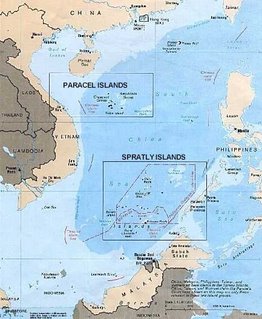Spratly Islands.

This is coolbert:
From the comment of JS Bolton:
"China has been pressing disputes with Malaysia over numerous reefs and islands that China says should really be theirs."
These are the Spratly Islands. Little chunks of rock out in the middle of the South China Sea.
Claimed to various degrees by five different nations:
* China.
* Vietnam.
* Malaysia.
* Brunei.
* Philippines.
The Spratly Islands are a point of contention in that part of the world [SE Asia]. Underneath the Spratly Islands are potentially enormous fields of oil? Oil having great wealth. Wealth coveted by all nations of the region, including China.
Now, when we speak of ISLANDS, do not understand the Spratly Islands to be islands as the word is commonly and ordinarily understood. Think of them as rather chunks of rock, if that, sticking above the waterline, and then only at low tide.
Normally, would only be of concern to navigators plying the waters of the South China Sea. But have become much more than that. Have become coveted for the alleged oil wealth, and also a point-of-honor [punador in Spanish] for all parties involved. Territorial disputes that could break out in warfare at a moments notice.
"point of honor - - n : a concern that seriously reflects on your honor"
There was a program on public TV some years ago that dealt with the subject of oceanic "choke points" such as the Straits of Malacca and also disputed "territory" such as the Spratly Islands. The Filipino government, to strengthen their "claims" to some of the Spratly Islands, has erected a guard post on one of the "islands". A wooden platform with a guard shack atop it was what the "occupation" consisted of. Just a few rocks with the shack above the waterline and that was that. NOTHING more! This sole guard left on duty could not even leave the shack without getting his feet wet!
As to those claims of vast oil reserves, alleged, underneath the Spratly Islands, well, don't hold your breath. There are significant oil and natural gas deposits in all the surrounding nations, BUT, as far as I know, no one has done enough significant drilling to justify claims of vast oil deposits. This is all speculation.
This whole matter also reminds me of the Gran Chaco War [Paraguay vs. Bolivia], the Falklands Islands War [Argentina vs. Britain], and even the Vietnam War [U.S. vs. North Vietnam]. In each case, the speculation was the same. Vast and extremely valuable oil deposits were at stake. In each case, again, as usual, NOTHING materialized!!
I would think that China probably claims the islands as a result of the "Treasure Fleet" voyages of Admiral Zheng He [1400's].
China in particular is most covetous of natural resources where ever they may be found. China could push it's weight around and everyone else involved in the Spratly dispute would feel compelled to give way.
[just recently the Chicago Tribune had an interesting article about China and it's involvement in the deforestation occurring right now in Papua New Guinea. The jungle is being laid waste for Chinese interests. To provide wood for the enormously expanding Chinese industrial base. You name it, oil, wood, etc., China will be in the hunt for rapidly-becoming-scarce natural resources in the future. China will NOT want to play second fiddle to the U.S. in this area!!]
Further from the comment of JS Bolton:
"Only countries with aggressive intentions engage in this pattern of activity."
China in it's long history has only on two occasions shown aggressive and outward looking intent. During the Chin Dynasty [220 B.C.], and during the Tang Dynasty [700 A.D.]. During the former, military expeditions from the Han homeland extended as far west as Lake Balkhash. During the latter, Chinese dominion stretched as far west and south as Afghanistan, almost to the Indian Ocean!! China might very well be on the course for a third historical expansion. An expansion mandated by the needs of rapid Chinese industrialization and an enormous rise in the standard of living within China to a western standard!! Access to and availability of resources has been a historical reason for war between nations.
coolbert.

1 Comments:
"China in it's long history has only on two occasions shown aggressive and outward looking intent."
Here is what John Derbyshire writes of how the book "Hegemon" addresses that claim:
"China, her officials and western mouthpieces will purr, has never been an expansionist power. As Mosher points out, this is untrue. China's territory has expanded more than tenfold since proper historical records began in the 8th century B.C. Her current land area is more than twice what it was at the height of the Ming dynasty 500 years ago— an average rate of expansion throughout the modern age of nearly 4,000 square miles per annum. This is even after allowing for the loss of Outer Mongolia in the 1920s, a loss which rankles bitterly: when Khrushchev visited Mao Tse-tung in 1959, the first item on Mao's agenda was a demand for the "return" of Outer Mongolia (by that time a Soviet satellite)."
http://www.olimu.com/journalism/Texts/Reviews/Hegemon.htm
11:56 AM
Post a Comment
Subscribe to Post Comments [Atom]
<< Home